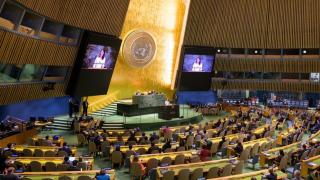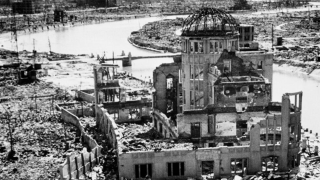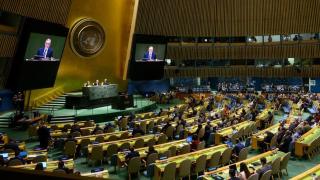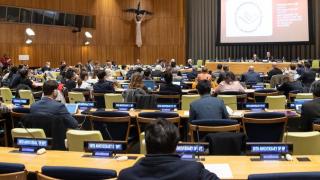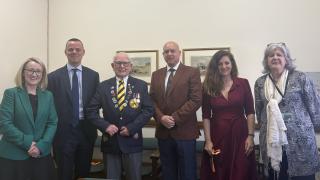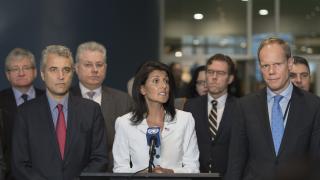
Part of our regular series of background briefings on the UN in the news.
UN member states have just created a treaty to prohibit nuclear weapons. The UK has refused to have any part of it. Meanwhile the traditional mechanism for reducing the spread and number of nuclear weapons, the Non Proliferation Treaty (NPT) is floundering in part due to concerns among non-nuclear states at the slow pace of disarmanment. This briefing explains some of the issues at play in the world of nuclear disarmament and non-proliferation.
What is the nuclear ban treaty?
The Treaty on the Prohibition of Nuclear Weapons, or "nuclear ban treaty", was adopted at the UN General Assembly on 7 July 2017 following a vote where 122 governments supported the treaty, 1 voted against (the Netherlands) and 1 abstained (Singapore). The treaty is the first multilateral legally binding instrument regarding nuclear disarmament to have been negotiated in 20 years. The treaty opens for signature on 20 September 2017 and enters into force 90 days after the 50th state ratifies it. Signing the treaty indicates support for the objectives and purposes of the treaty and will often indicate a state's future intention to ratify. Ratification is the point at which a state becomes legally bound to implement the treaty - as such, all necessary national arrangements and procedures must be in place by this point.
How did it come about?
The initiative to develop a new treaty to ban nuclear weapons emerged in 2010, when governments at the 2010 NPT Review Conference expressed their deep concern at the "catastrophic humanitarian consequences of any use of nuclear weapons". In 2012 and 2013, through NPT Preparatory Committees and the General Assembly's First Committee, growing numbers of states expressed a desire to intensify efforts to outlaw nuclear weapons. In 2013 - 2014, progressive states worked closely with civil society organsiations to organise conferences in Norway, Mexico and Austria to explore the humanitarian impact of nuclear weapons. Over the course of these conferences - which were attended by over 120 states, UN agencies and civil society - the dangers of accidental use, the environmental devastation and the inability of the international community to mount a humanitarian response to a detonation were discussed. Impetus for a ban grew.
After the 2015 NPT Review Conference - the traditional forum for discussions on disarmament - ended without adopting an outcome document, states in the General Assembly agreed to set up an Open-Ended Working Group to advance multilateral nuclear disarmament. The Group met in Geneva during 2016 and concluded with a recommendation that formal negotiations should begin the following year on a treaty to prohibit nuclear weapons. The recommendation was adopted in the General Assembly in December 2016 with 113 states voting in favour, 35 against, and 13 abstentions. The UK voted against the resolution, joining other NATO members and US allies in opposing the negotiations.
Negotiations mandated by the General Assembly took place at the UN in New York during March, June and July 2017 attended by some 130 states and dozens of civil society organisations. The opening session included statements from Pope Francis and Peter Maurer, head of the International Committee of the Red Cross, as well as survivors from the devastating Hiroshima detonation on 6 August 1945.
Why is the UK and NATO so opposed to a treaty?
The UK's engagement with the process has been minimal, with the UK maintaining that it favours a "step-by-step" approach through existing disarmament structures, including the NPT. However, many non-nuclear weapons states believe recent progress through the NPT has been slow, with nuclear weapons states preferring to use the forum to focus on the issue of non-proliferation rather than disarmament. This has raised questions over nuclear weapons states' commitment to the fundamental bargain at the heart of the NPT: the 185 non-nuclear signatories are prohibited from developing nuclear weapons; in exchange, the five signatories that hold nuclear weapons (including the UK) must commit to a process of multilateral nuclear disarmament.
None of the "nuclear five" (N5) or the four other non-signatory states which possess nuclear weapons participated in the 2016 Open-Ended Working Group discussions or the 2017 treaty negotiations.
As delegates gathered for the opening of negotiations in March 2017, the US ambassador to the UN, joined by representatives from around 20 allies including the UK, held a press conference to explain their opposition to the negotiations. US ambassador, Nikki Haley said: "When you see those walking into the General Assembly to create a nuclear weapons ban, you have to ask yourself, are they looking out for their people? Do they really understand the threats that we have? [...] In this day and time we can't honestly that say we can protect our people by allowing the bad actors to have them and those of us that are good, trying to keep peace and safety, not to have them." During the press conference, UK ambassador Matthew Rycroft commented "we do not believe that [the UN] negotiations will lead to effective progress on global nuclear disarmament".
Japan - the only country to have suffered a nuclear attack - did not participate in the talks, citing doubts that the talks would "actually lead to the elimination of nuclear weapons, in cooperation with the nuclear weapon states".
What is extended deterrence?
NATO members as well as a small group of US allies in the Asia-Pacific region (including Australia, Japan and South Korea) are under the US's extended nuclear umbrella. As the treaty was adopted, the US State Department was quick to point out that "no US ally that relies on extended nuclear deterrence supported the final text". Some of these states participated in the conferences leading up to the 2017 negotiations, and the Netherlands - a NATO member which hosts nuclear weapons on its territory - participated fully in the negotiations but voted against the adoption of the treaty.
What difference will it make?
Those bound by the treaty are legally bound not to use, threaten to use, produce, possess, acquire, transfer, test or deploy nuclear weapons. However, no state that either possesses or that receives security assurances through extended nuclear deterrence looks likely to join the treaty in the near future.
At an event organised by UNA-UK, Matthew Rycroft, the UK's ambassador to the UN, insisted the ban treaty will have "zero effect in the real world".
UNA-UK disagrees. The treaty could play an important part in strengthening the norm opposing nuclear weapons. The support by a majority of states for a treaty that regards nuclear weapons as unacceptable sends out a strong political and moral statement, and looks set to create a de facto nuclear-weapons-free zone covering a large proportion of the world. Looking at other inhumane weapons - biological, chemical, landmines, cluster bombs - history has shown that over time, norms can play an important role in stigmatising and delegitimising them; treaties can strengthen these norms. The treaty also provides a campaigning opportunity for civil society and parliamentarians.
Opponents of the treaty have argued that the treaty has widened divisions between nuclear weapon states and non-nuclear weapons states and distracts from existing disarmament structures. There are also concerns that disagreements between historic allies on security issues could make it harder to maintain a united front in the face of aggression from, for example, North Korea. Critics have further speculated that the treaty could disproportionately affect western democracies: of those that join the treaty, democracies may feel more obliged to uphold the treaty than their non-democratic counterparts, and of those who oppose the treaty, it is those states with more active civil societies (largely located in the West) that may be more sensitive to global norms and pressure.
While UNA-UK understands the range of views on this issue, on balance we believe that the long-term effect of the treaty will be positive, in time giving new impetus towards an objective UNA-UK has pursued for over 70 years: a world free of nuclear weapons.
What next?
UNA-UK called for the UK to participate fully in the conferences leading up to the negotiations as well as the negotiations themselves. Now we are in a situation where there is a lack of international cooperation on nuclear security issues and the potential for a new arms race to emerge between nuclear powers. Principled leadership on the world stage is sorely needed.
As a country which possesses nuclear weapons and which often professes its strong support for the NPT, the UK has a responsibility to engage with and address the legitimate concerns of non-nuclear weapon states. Working with the nuclear security organisation BASIC, UNA-UK has outlined 30 opportunities for UK actions which could carry cross-party support and which would help the UK signal its commitment to multilateral disarmament. By taking such actions, the UK could restore trust and build bridges with the non-nuclear weapons states, contributing much-needed leadership to what is an increasingly divisive and dangerous international issue.
Image: Briefing by States Opposing Conference on Nuclear Weapons Prohibition Treaty - Nikki R. Haley (centre), Permanent Representative of the United States; Alexis Lamek (left), Deputy Permanent Representative of France; and Matthew Rycroft, Permanent Representative of the United Kingdom. (c) UN Photo/Mark Garten

